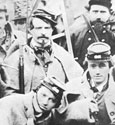
Ein Feste
 One hymn that had a profound effect was "Ein Feste Burg ist unser Gott.”
One hymn that had a profound effect was "Ein Feste Burg ist unser Gott.”
When Fort Sumter was fired on, and the Civil War began, the north was united on only one issue, the defense of the Union. Whittier felt it was necessary to focus the North on the issue of slavery, and “Ein Feste Burg Ist Unser Gott”, subtitled “Luther’s Hymn,” was an attempt to do so. The poem was published in the Independent in June 1861, and its attacks on slavery attracted attention immediately.
When the Hutchinson Family Singers, who were at the height of their popularity, got a permit to sing at army camps, sang the stanza that includes:
What breaks the oath
Of the men o’ the South?
What whets the knife
For the Union’s life?—
Hark to the answer: Slavery!
in a church in Fairfax, Virginia, a fight nearly erupted until the Hutchinsons prevented violence by singing another piece. Their permit to sing for the troops was revoked, but a few days later when the poem was read out at a cabinet meeting in Washington, it met with unanimous approval, and Lincoln said it was the kind of song he wanted the soldiers to hear. The Hutchinson’s their permit was reinstated. Lincoln later told a war correspondent that the reading of the poem had influenced him to issue the Emancipation Proclamation. (Woodwell 304) Perhaps Lincoln was moved by the following stanza:
In vain the bells of war shall ring
Of triumphs and revenges,
While still is spared the evil thing
That severs and estranges.
But blest the ear
That yet shall hear
The jubilant bell
That rings the knell
Of Slavery forever.
Full text of "Ein Feste"
